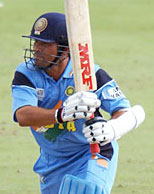Home > Cricket > World Cup 2003 > Reuters > Report
Tendulkar attracts the accolades
John Mehaffey |
March 22, 2003 12:56 IST
Four players in the history of cricket have attracted adulation and capacity crowds regardless of the state of the match or the status of the opposition.
W.G. Grace, the great Victorian, was the first. Don Bradman, in Australia during the great depression, was the second. In the 1960s, West Indian Garfield Sobers, first of the jet-age players to ply his trade around the globe, was a third.
Now in the early years of the 21st century, Sachin Tendulkar, the little master critical to India's World Cup chances against Australia on Sunday, possesses a similar aura and commands similar awe.
 Since his 1989 Test debut as a 16-year-old against the daunting Pakistan pace trio of Imran Khan, Wasim Akram and Waqar Younis, Tendulkar has carried the burden of a cricket-obsessed nation's expectations.
Since his 1989 Test debut as a 16-year-old against the daunting Pakistan pace trio of Imran Khan, Wasim Akram and Waqar Younis, Tendulkar has carried the burden of a cricket-obsessed nation's expectations.
At the start of a series brimming with all the tensions of an India-Pakistan clash, a poster in the stands at Karachi carried the contemptuous message "Child, what are you doing here?".
A month later, after Tendulkar had taken Pakistan's leg spin wizard Abdul Qadir apart in a one-day international, another sign was spotted. It read: "A tiger has arrived".
Tendulkar's talent was evident as a child in Bombay, where he was born on April 24, 1973. Always precocious, his immaculate technique and diminutive stature were reminiscent of his compatriot Sunil Gavaskar, the world record holder for test centuries. His penchant for attack reminded suffering bowlers of Viv Richards,
After the Pakistan tour, India travelled to New Zealand where Tendulkar had the chance to become the youngest Test centurion in the seaside town of Napier. On 88 and with a century in his grasp, he drove a catch to the New Zealand captain John Wright, now the India coach.
That oversight was rectified in the sun-drenched English summer of 1990, when the teenager hit a magnificent century to save the match for his team at Old Trafford.
"We'll see a lot more centuries from his bat," said commentator Richie Benaud. "I hope I'll be around to see them."
An avalanche of runs has followed against the world's best bowlers. Tendulkar's particular genius has been to combine purity of style with an extensive variety of strokes and consistent heavy scoring in both test and one-day cricket.
He averages just under 58 in Test cricket, among the top half dozen in history, and his 31 centuries are second only to Gavaskar. In one-day cricket he averages an equally impressive 44.58 with a strike rate of 86.54.
Tributes have flooded in, with the word genius cropping up repeatedly. The most famous has inevitably been the accolade from Bradman, whose Test average of 99.94 has never been approached.
"He plays much the same as I played," Bradman told a television interviewer after watching Tendulkar bat against Australia at the 1996 World Cup.
Split screen shots showed the bat speed, balance and quick footwork were identical. Like the late Australian, Tendulkar's initial move is back to the fast bowlers, forward to the slow though, in common with modern trends, his bat is significantly heavier.
For this tournament, Tendulkar has shaved three ounces off his bat and, in particular, has scored heavily through the leg side, taking the ball of his stumps in a manner reminiscent of Richards.
"It allows him to play all the shots, all around the wicket, his balance and timing are outstanding," said former India all rounder Ravi Shastri. "This is the best I have seen him since 1998 against Australia."
Australia have particular reason to be wary of Tendulkar. In 1998 he reduced Shane Warne to the ranks of the mortals, scoring 446 runs at 111.50 with some dazzling footwork in a 2-1 series win at home.
Inevitably, Tendulkar's career has not been one of unblemished triumph.
He has had two spells as India captain, losing the job after his first attempt and standing down after the second. His relationship with the Indian media has sometimes been fraught, particularly after suggestions that, unlike his West Indies contemporary Brian Lara, he does not win matches for his country.
Only Bradman would have any conceptions of the pressures on Tendulkar. Bradman carried the hopes of his countrymen during the 1930s and, even after retirement, was never able to lead a normal life.
But even Bradman endured only a portion of the media, public and commercial pressures Tendulkar faces after signing a five-year commercial deal worth $18 million in 2001.
Life for Tendulkar in India is akin to life as a Beatle at the height of the 1960s, but through all the hype and hysteria he has retained his dignity.
And always the team has come first. Tendulkar will open the innings on Sunday against Brett Lee and Glenn McGrath with a new ball.
"I want India to win more often," he said. "For this it is necessary I get runs and that I get them quickly."
© Copyright 2003 Reuters Limited. All rights reserved. Republication or redistribution of Reuters content, including by framing or similar means, is expressly prohibited without the prior written consent of Reuters. Reuters shall not be liable for any errors or delays in the content, or for any actions taken in reliance thereon.
|